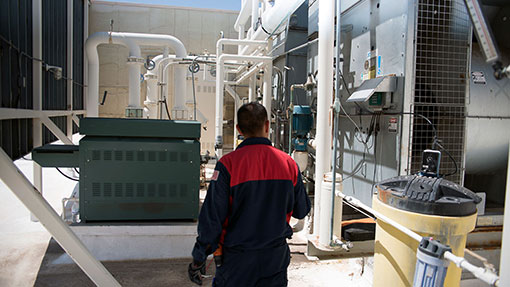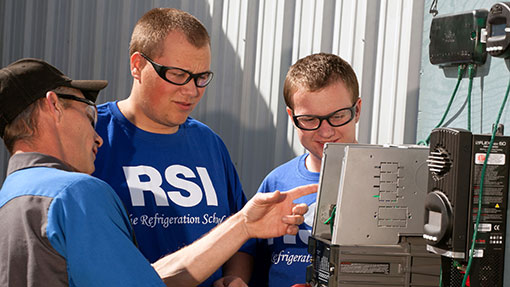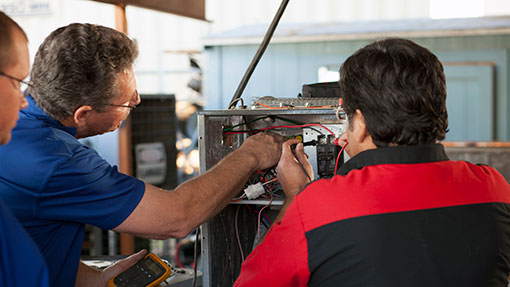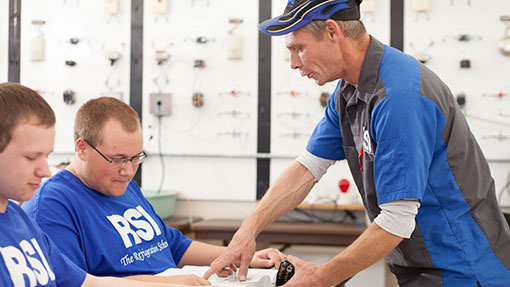Welding Specialist
Duration: 7 Months
RSI is the right choice
HVAC/R Training Since 1965
Graduates Placed in all 40+ States
Graduates initially employed in 44 states according to our ACCSC Annual Report data for reports dated 7/1/18 – 7/1/2023
Over 10,000 Graduates¹
Upcoming Class Start Dates
| Class | Location | Date |
|---|---|---|
| Welding Classes Start | Phoenix, AZ | 08/12/2024 |
| Welding Classes Start | Phoenix, AZ | 09/16/2024 |
Class Schedules (Monday-Friday)
| Morning | Afternoon | Evening | Overnight |
|---|---|---|---|
| 7am-12:15pm | 12:45pm-6pm | 6:30pm-11:45pm | 12:00am-5:15am |
Weekend Schedule
| Tue/Thu (Classroom) | Sat/Sun (Lab Days) |
| 6:30pm-9:00pm | 8:00am-6:00pm |
Program Availability Notice
It's the New Year and our welding program is in high demand! Are you planning to become a welder in 2024? Click below for our upcoming class availability.
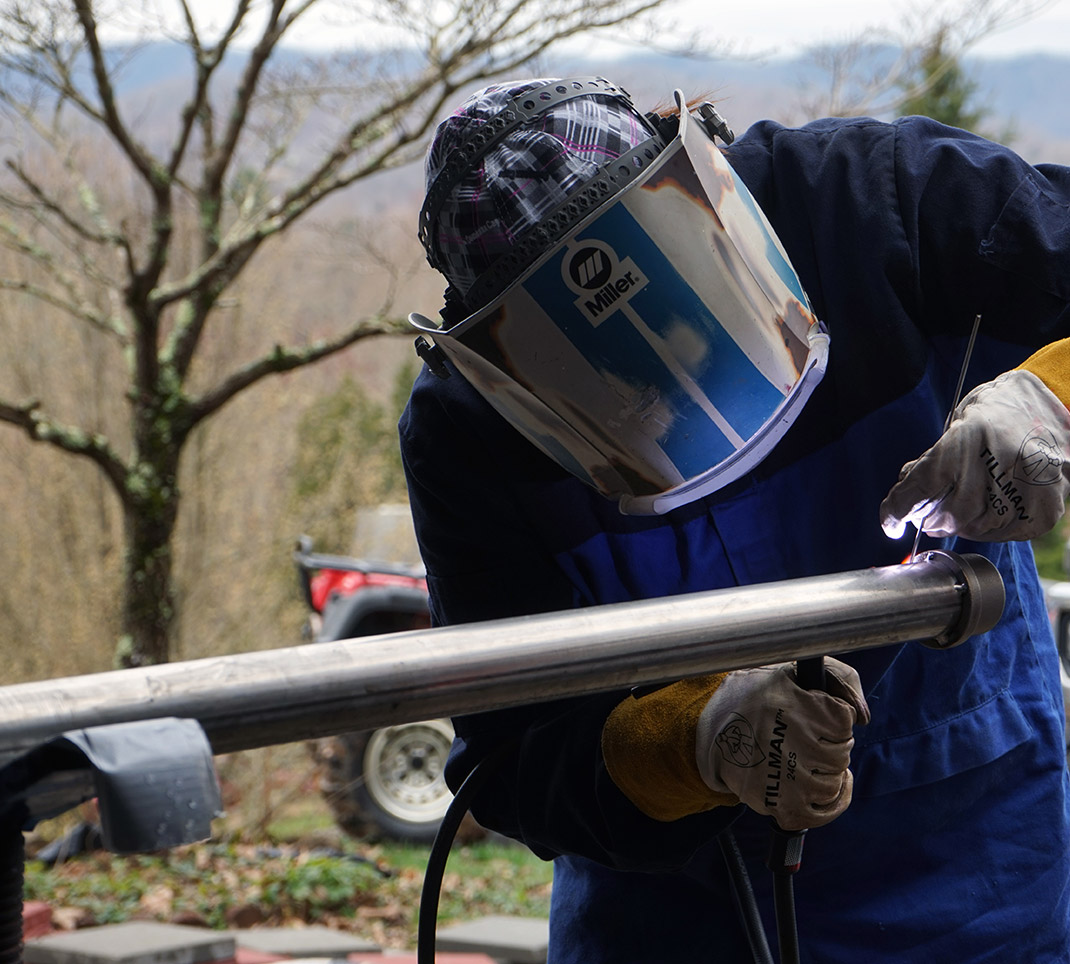
These days, many employers are looking for workers with formal welding training.i In RSI’s Welding Specialist program, students receive hands-on training in core welding processes with widespread industry applications: shielded metal arc welding (SMAW), gas metal arc welding (GMAW), flux-cored arc welding (FCAW), and gas tungsten arc welding (GTAW). Instruction is provided in fundamental welding procedures, such as how to prepare arc welding equipment, cut metal using thermal torch techniques, and prevent weld distortion. Welding safety best practices and basic metallurgy are also taught.
Students are awarded a diploma after successful completion of RSI’s welding program, which is also designed to prepare them for the American Welding Society welder certification and similar employer tests. Such credentials can improve welder career opportunities.i
The aim of RSI’s Welding Specialist program is to equip students with the welding skills necessary for entry-level positions in thin alloy, structural, and pipe and pipeline welding. These types of welding have applications in several key industries: construction, transportation, manufacturing, petroleum and many more.
Choose a Dedicated Welding Training Program
RSI offers a focused, hands-on welding program with plenty of benefits for students.
- Time: Complete your welder training in as little as 7 months!
- Small Class Sizes: 20:1 student-teacher ratio.
- Flexible Scheduling: Welding lab takes only 5 hours per day, 4 days a week (75% of your training time); the other day is spent in class. With morning, afternoon and evening welding courses available, you can work while you train.
- Industry Standard Equipment: Train on the same kinds of equipment you could use when you get a job, such as welding machines, plasma and track cutters, and bench grinders.
- Experienced, Professional Instructors: Learn from welders who know the industry firsthand from experience.
Employment is Expected to Grow for Welding in the US by 42,600 Jobs by 2032!ii
What You’ll Learn in RSI’s Welding Classes
Developing critical welding skills is the first step toward a career that could one day have you constructing buildings, bridges and highways, fusing massive pipelines, or welding aircraft. Take a look at what you’ll learn in RSI’s Welding Specialist program courses and where those skills could take you.
Request More Info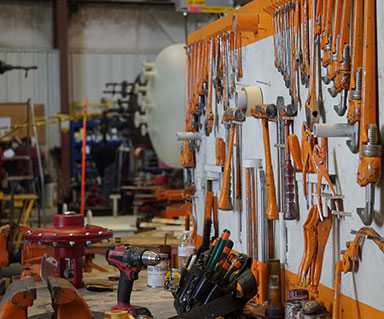
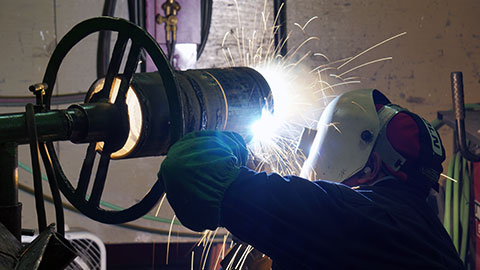
Why Choose RSI for Your Welding Education
RSI offers more than a dedicated welding training program. The school has a long history of preparing students for successful careers in the skilled trades. It not only provides students with support while they’re training but also long after they’ve graduated.
- Established Skilled Trades School: Over 50 years of excellence in training students for technical careers.
- Industry Recognition: An ACCSC accredited school.
- Graduates: Over 10,000 graduates1.
- Student Services: Continuous, on-campus tutoring and support from caring, competent student services administrators.
- Career Services: Assistance writing resumes, securing full and part-time employment, and discovering upcoming career opportunities.
- Scholarships & Financial Aid Services: Pell Grants, scholarships, and student loans. (Financial aid to those who qualify.)
- Graduate Support: RSI graduates in good standing can return anytime to refresh their training in courses they’ve successfully completed, as well as receive employment assistance. (Subject to availability of classroom space.)
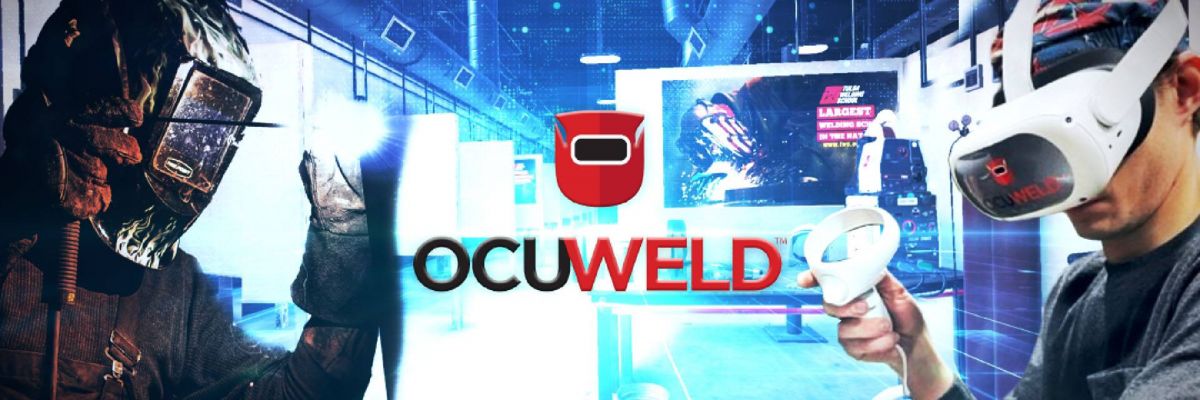
ALL New Welding Students Get an Oculus Quest 2 loaded with OcuWeld Training Software!
TWS is excited to launch OcuWeld utilizing Virtual Reality (VR) to enhance your welding training. OcuWeld is a new and innovative Virtual Reality (VR) welding simulator designed by expert welding instructors for our welding students.
You can access OcuWeld anytime, anywhere – with or without WIFI. It enables you to practice your welding skills as part of our program here at TWS and the Oculus Quest 2 is yours to keep!
Learn MoreWelding Program Courses & Their Applications
Welding Fundamentals
This course is designed to provide the student with a wide range of fundamental information about a career in welding and to begin building critical welding skills. Students learn about career opportunities and the importance of safety awareness that will be reinforced in later laboratory exercises. Other fundamental skills include learning the basic layout of construction drawings and how to read and correctly interpret welding symbols. Students learn thermal torch techniques to cut flat stock. They will also learn and use Plasma Cutting and Carbon Arc gouging procedures. As they begin to learn about arc welding processes, students learn to set up welding equipment, the components of an arc welding machine, and the various types of electrodes used in arc welding procedures. Using an E7018 electrode, students begin by practicing basic SMAW welding processes and technique. Project assignments allow students an opportunity to practice and develop welding and cutting skills.
WLD101
- 4 Semester Credit Hours
- 25 Lecture Hours
- 100 Lab Hours
- 125 Total Contact Hours
- 7 Outside Prep Hours
GMAW/FCAW Processes
This course is designed to introduce students to two new and related welding processes. GMAW or MIG uses a torch designed to provide a shielding gas for the weld and an automatic wire feed system that provides a constant feed of the filler metal. FCAW or Fluxcore uses a similar torch but uses a powdered flux to shield the weld. These processes are a considerable departure from processes previously used. Students learn to set up and operate GMAW/FCAW welding equipment. These processes are applied in different combinations for welding plate in various basic positions. Students learn to correctly prepare pipe for GMAW/FCAW welding processes. In addition, as part of an expanding knowledge about construction drawings, students learn about isometric drawings and their importance as a three-dimensional picture of an object.
WLD105
- Prerequisite Course(s): WLD101, WLD110, WLD115, WLD120
- 4 Semester Credit Hours
- 25 Lecture Hours
- 100 Lab Hours
- 125 Total Contact Hours
- 7 Outside Prep Hours
Structural Welding
This course essentially focuses on developing flat welding techniques in three basic positions and builds on the fundamental knowledge and skills learned in WLD101. SMAW processes are used to practice weld technique and perform basic butt welds using mild steel. Two primary welding electrodes are applied to various welding exercises and students learn fundamental procedures related to root pass and fill welds. Students continue to build their skills through a series of project exercises designed to reinforce skills and knowledge learned. Students expand their knowledge about related welding diagrams and drawings and methods of coding various types of metal. Drawings are used to communicate lab project information and reinforce reading and interpreting welding symbols. Students are also introduced to basic destructive weld testing techniques and the importance of quality welds to achieve maximum strength and integrity of the metal. Basic principles of metallurgy explain to students the changes in metals’ internal structure during the heating and cooling processes. Students are also introduced to welding pipe. The challenge is to weld consistently while moving around the pipe. Five-inch diameter pipe is cut using thermal processes and prepared for welding. For the exercise, students weld pipe in only one basic position.
WLD110
- Prerequisite Course(s): WLD101
- 4 Semester Credit Hours
- 25 Lecture Hours
- 100 Lab Hours
- 125 Total Contact Hours
- 7 Outside Prep Hours
Pipe Welding
This course presents new challenges from the first two courses. Students expand their knowledge and skills to perform and practice basic pipe welding techniques using two welding processes (SMAW & GTAW). The GTAW process is introduced and students practice performing basic root welds on pipe coupons. The remainder of the welding procedure applies SMAW processes to complete the fill and cap welds. Reading and interpreting basic pipe drawings, students cut pipe coupons to length and bevel the pipe ends using thermal and mechanical beveling processes. Students face their first experience at practicing uphill and other welding techniques simultaneously. They practice welding in multiple positions as they travel around the pipe to complete the weld. Also, as a continuation of basic metallurgy, students learn various techniques for identifying types of metal using visual and mechanical testing techniques.
WLD115
- Prerequisite Course(s): WLD101, WLD110
- 4 Semester Credit Hours
- 25 Lecture Hours
- 100 Lab Hours
- 125 Total Contact Hours
- 7 Outside Prep Hours
Advanced Pipe Welding
Students continue to develop, apply and practice their pipe welding skills. Mild steel pipe is welded in various positions using primarily GTAW (TIG) welding processes. In addition, students learn to use stainless steel electrodes to weld high carbon steel. Using two-inch diameter pipe, students practice using the GTAW process to weld the root and complete the fill and cap portion of the weld using SMAW processes. They also learn to properly rig and balance pipe loads, use hand signal communication to the crane operator, and lift and place pipe in preparation for welding operations. Most pipe welding is performed in an open environment using various types of portable welding equipment. Students learn to set up and safely operate portable welding units for structural and pipe welding operations. Emphasis is given to awareness about electrical safety and steps necessary to prevent electrical shock.
WLD120
- Prerequisite Course(s): WLD101, WLD110, WLD115
- 4 Semester Credit Hours
- 25 Lecture Hours
- 100 Lab Hours
- 125 Total Contact Hours
- 7 Outside Prep Hours
Welding Capstone
The welding capstone course is a transition course from the classroom to the field. Students are challenged in the laboratory to use all the welding knowledge and skills they have gained in a series of exercises designed to reinforce prior instruction, hone skills, and practice production rates that meet industry standards. Students are given three possible options they can pursue to complete course requirements. The selection of the option depends on the method students intend to apply after graduation.
WLD125
- Prerequisite Course(s): WLD101, WLD105, WLD110, WLD115, WLD120
- 4 Semester Credit Hours
- 25 Lecture Hours
- 100 Lab Hours
- 125 Total Contact Hours
- 7 Outside Prep Hours
Sound Interesting? Contact us for more information on this course and the Welding Specialist Program.


